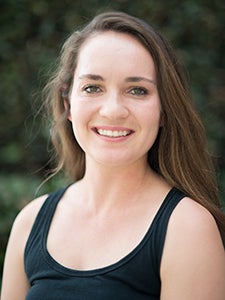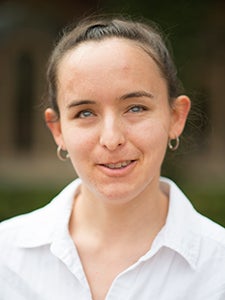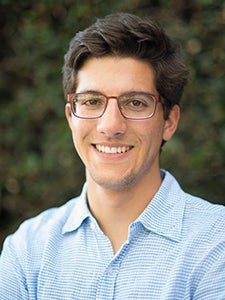Three of the Best
Shea Livingston
After Shea Livingston’s grandfather died in 2010, she and her mother were sorting through his papers when they found an extraordinary document: a leather-bound graduation program embossed with the words “1915 University of Southern California.”
“Inside, I found my paternal great grandfather’s name — Milton McWhorter Livingston,” the physics major said. “I knew my great grandfather had gone to USC, but I had no idea when he graduated. When I found that program and realized I would be graduating exactly 100 years after him I was absolutely thrilled. It made me feel so much closer to him.”
After earning his master of arts degree in history in 1915, McWhorter Livingston went on to become a citrus farmer in Pomona, California, a high school teacher and a Presbyterian minister. He also fathered eight children, including Livingston’s great uncle, Milton Stanley Livingston, a well-known physicist.
“I guess physics runs in our family because my great uncle built cyclotrons, one of the earliest types of particle accelerators, with Ernest Lawrence, his professor at University of California, Berkeley,” Livingston said. Lawrence later won the 1939 Nobel Prize for his invention. Livingston discovered that one of her instructors at USC Dornsife, Vitaly Kresin, professor of physics and astronomy, had worked at Lawrence Livermore Laboratory, which was named for Lawrence.
“The more I learned about my family history, the more it felt like my academic career at USC Dornsife brought me full circle,” Livingston said.

Shea Livingston. Photos by Peter Zhaoyu Zhou.
Born in Flagstaff, Arizona, Livingston grew up there and in Tucson, Arizona. “When I was in middle school my older cousin went to USC. I heard so many wonderful things about it that I became fascinated with USC,” she said. “It became a dream school for me.”
One of the reasons she was drawn to Los Angeles and to USC was the scale of each, she said. “Tucson has a small-town feel with a much slower pace. I like to be busy and Los Angeles always has something going on. USC felt the right size as well — not too small and not too big. When I toured the school I loved the vibe.”
Livingston came to USC Dornsife on a U.S. Navy ROTC scholarship. “Once I graduate I am going straight to a ship in San Diego where I will be an officer,” she said. “I’m not sure where the Navy will take me, but later on I’m interested in working for Raytheon, the defense contractor. I’d like to be on the business side, perhaps in marketing.”
“I’m excited to take the next step and be working. But I love it here so much, it feels like home and so leaving is sad,” Livingston said. “At least I’ll be in San Diego so I’ll be close.”
Karen Arcos
A Latina first-generation college student, McNair Scholar Karen Arcos is completely blind. She is also an inspiration to all who know her.
Advised by high school special education staff to downscale her dream of attending university in favor of a two-year college, Arcos, a psychology major and Spanish minor, stuck to her guns, overcoming multiple challenges to attend USC.
Her determination paid off. Arcos was recently honored with a Discovery Scholars Prize through her participation in the psychology honors program, and she presented research stemming from her involvement in USC Dornsife’s HSBC Fellows Program at a regional conference. Arcos was also offered admission to a one-year master’s program at Harvard University. Instead, she will pursue graduate study at the University of California, Irvine, undertaking a five-year Ph.D. program in psychology with a concentration in cognitive neuroscience.
“While earning my Ph.D., I’d like to research how visually impaired students comprehend information and how different reading mediums impact learning,” Arcos said.
A Los Angeles native, she is the daughter of a Colombian kindergarten teacher and a former art teacher from Mauritius. She was born premature and lost her sight at a few months old when her retinas detached in both eyes.

Karen Arcos.
“From the very beginning, my parents instilled in me the importance of higher education,” Arcos said. She also credits her educational aspirations to her participation in Gaining Early Awareness and Readiness for Undergraduate Programs (GEAR UP).
“I’m a first-generation college student, so GEAR UP was instrumental in exposing me to the college application process at an early age,” Arcos said.
With the encouragement of GEAR UP counselors and general education high school teachers, she applied to college through QuestBridge, a nonprofit organization that connects high-achieving, low-income, first-generation college students to leading partner universities, including USC.
Instructed on assistive technology by teachers of the visually impaired, Arcos uses the BrailleNote Apex to help her learn. “It’s similar to a computer, but instead of a screen it has a braille display. I also use a screen reader on my laptop called Job Access With Speech (JAWS) to access material.”
In 2012, Arcos co-founded a support group for visually impaired youth and their families. Survive or Thrive encourages middle school and high school students and their parents to prepare early for life after high school.
This semester Arcos interned at her former preschool, Blind Children’s Center, where she volunteered for 11 years. Interning allowed her to apply learning and behavioral principles from her psychology courses to the students she taught.
“Before coming to USC, most of my friends had a disability,” Arcos said. “Now, my friends on campus have no visual impairment. We were able to become friends, but it took time and willingness on their part, and on mine, to let them know I can do just as much as they can.”
Thomas Armstrong
Determined to “live an international life,” Thomas Armstrong got a head start on his dream in high school when he made his first trip to China to retrace the Silk Road on foot, camel and horseback with nonprofit organization Where There Be Dragons.
“That was my first window into an unfamiliar world,” said Armstrong, who arrived at USC Dornsife in 2011 as a Trustee Scholar. A double major in international relations and history, Armstrong — after two further trips to China under the auspices of USC Dornsife and the U.S. government — now speaks Mandarin proficiently.
After his freshman year, he was awarded the Global East Asia Scholarship and traveled to Shanghai to study economics with Brett Sheehan, professor of history.
Following his sophomore year, Armstrong traveled to Europe where he spent the summer interning at Egmont — The Royal Institute for International Relations, an independent international relations think tank based in Brussels. “I got to listen to Europe’s military leaders, meet the United States Permanent Representative to NATO and visit various E.U. institutions,” he said. “It was a great hands-on experience.”
Last summer, Armstrong returned to China, spending two months in Suzhou on a Critical Language Scholarship, funded by the U.S. State Department.

Thomas Armstrong.
The highlights of Armstrong’s star-studded academic career at USC Dornsife include: receiving the Murray Heichert Award for superior academic scholarship; winning first prize in the social justice category of the 2014 Levan Ethics Essay Contest; and serving as president of the Phi Alpha Theta National History Honors Society.
Armstrong also served as Lead Campus Ambassador for Teach For China, a nonprofit that seeks to eliminate educational inequity in China.
As editor-in-chief of Glimpse from the Globe, an online publication created and managed by USC undergraduates interested in international affairs, Armstrong oversaw staff expansion, the construction of a customized website and an increased publication rate.
“We were just recognized at the Tommy Awards as the best academic organization on campus. It’s very exciting and I hope it continues to grow,” said Armstrong who, once he graduates, will join Glimpse’s founders as a governor, serving in an advisory role.
After graduation, he is headed to Washington, D.C., to take up a consulting position with Ernst and Young. “I’m going to be working on this experimental team focusing on cyber economics and how to advise private companies in the event they are hacked.”
Armstrong said he is interested in later pursuing a dual graduate degree in international affairs with either law or business.
“I’ve always dreamed of working in the foreign service to make the world a better place. Professor Lamy [Steven Lamy, professor of international relations and vice dean for academic programs] has this great phrase. He says we shouldn’t just fight on — we should fight on for something that matters. That’s something I certainly believe in and hope to accomplish in my career.”